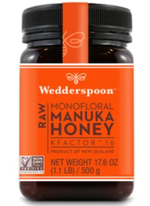Meet the Manuka honey brand with every certification shoppers could want
Plus, learn how Wedderspoon earned its spot as a designated ambassador of the New Zealand story.

Get to know Wedderspoon, the first company to bring USDA organic certified Manuka honey to North America. But its efforts to promote organic and regenerative farming extend much farther and wider than this milestone. Read on to learn about its unique sourcing strategies, certifications and impressively sustainable supply chain.
How has Wedderspoon’s partnership with the Rodale Institute shaped its business?
Wedderspoon has been a proud partner of the Rodale Institute since 2012. We believe their research on regenerative farming is vital for the future of pollinators and our food system. Through our partnership, we have learned the importance of the treatment-free approach to honeybee management and continue to do our best to educate consumers and our followers on the ways that they can enact positive changes, large or small, in their own lives to benefit pollinators.
And in New Zealand, our master beekeepers champion a sustainable, bee-first ecology and gentle harvest, allowing our precious pollinators to work as Mother Nature intended. The legacy of our mission lives on today in products that celebrate Manuka honey in its most perfect, least processed state: A rare gift, brimming with nourishment.
Could you expand on the importance of organic to Wedderspoon?
 Since our founding in 2005, we have prioritized providing the most premium Manuka honey to our consumers. As organic Manuka honey is incredibly rare and our supply is limited, we have only been able to offer organic honey in our value-added products (organic drops, pops and lip balms). However, as of this year, we are incredibly proud to announce the launch of our Raw Organic Monofloral Manuka Honey–the first organic Manuka honey in North America! This delicious addition to our product lines is USDA organic certified and harvested in the remote, pristine landscape of New Zealand's South Island.
Since our founding in 2005, we have prioritized providing the most premium Manuka honey to our consumers. As organic Manuka honey is incredibly rare and our supply is limited, we have only been able to offer organic honey in our value-added products (organic drops, pops and lip balms). However, as of this year, we are incredibly proud to announce the launch of our Raw Organic Monofloral Manuka Honey–the first organic Manuka honey in North America! This delicious addition to our product lines is USDA organic certified and harvested in the remote, pristine landscape of New Zealand's South Island.
Describe Wedderspoon’s pollinator conservation efforts.
Beyond our partnerships with the Rodale Institute and the Whole Foods Foundation, our beekeepers focus is on sustainable beekeeping practices. To reduce honeybee stress, our beekeepers extract raw comb from each hive as swiftly and stealthily as possible. A portion of honey is always left untouched to help the bees ward off hunger pangs during the chilly New Zealand winter.
What certification is Wedderspoon proudest to have on its products’ labels and why?
That’s a tough one! We are definitely proud of all of our certifications. However, there are a few that I’m happy to speak to here. First and foremost, our FernMark license is extremely important to us. A license to bear the FernMark is formal recognition of a company’s role as an ambassador of the New Zealand story. It is a privileged role that requires a business to responsibly represent New Zealand offshore and to always protect the wellbeing and reputation of the country.
Wedderspoon takes pride in harvesting, packaging and labeling all jars of our Manuka Honey in New Zealand. Globally, we were the first Safe Quality Food (SQF) certified Manuka Honey facility and still are the only Manuka Honey facility who scored a 100% on Level 3 SQF certification requirements for both food safety and food quality.
In addition to those, our Manuka Honey is Glyphosate Residue Free certified by The Detox Project and Non-GMO Project verified by the Non-GMO Project. We honor our customers by ensuring our Manuka Honey is tested and free of pesticides, glyphosate and antibiotics.
Sustainable supply chains are increasingly important to today’s consumers. How does Wedderspoon spark change in terms of being a sustainability-focused brand?
We pride ourselves on always doing our due diligence to find innovative ways to support the bees specifically and the environment in general. Due to the nature of our business, we have a carbon footprint that cannot be denied, but we are working toward offsetting it much as possible through a number of different avenues.
Last December, the New Zealand Prime Minister announced the intention to move to carbon neutrality for all New Zealand exports. With the arrival of COVID-19 and this being an election year in New Zealand, this has been pushed back.
We are currently an SQF Level 3-certified organization, meaning we meet the highest standards for both safety and production quality of our Manuka honey products made in New Zealand. We are currently looking to add an accredited certification, called the SQF Fundamental Factors for Social Responsibility certification, as it includes environmental responsibility.
Regardless of which accreditation we pursue, we must calculate our carbon footprint by calculation of emissions of the New Zealand plant from electricity usage, waste, freight, flights, vehicles, etc., in an effort to pursue reduction and/or offsetting.
It is a priority for Wedderspoon to identify the right program and begin to offset our carbon footprint as soon as the legislative delays caused by the pandemic are resolved.

Learn more about Wedderspoon and see its latest products in the Spark Change Product Discovery Zone virtual expo. Visitors can:
Find the latest products.
Get sales sheets and other downloadable information.
Connect with the sales team.
Head to the Product Discovery Zone.
About the Author
You May Also Like




.jpg?width=700&auto=webp&quality=80&disable=upscale)